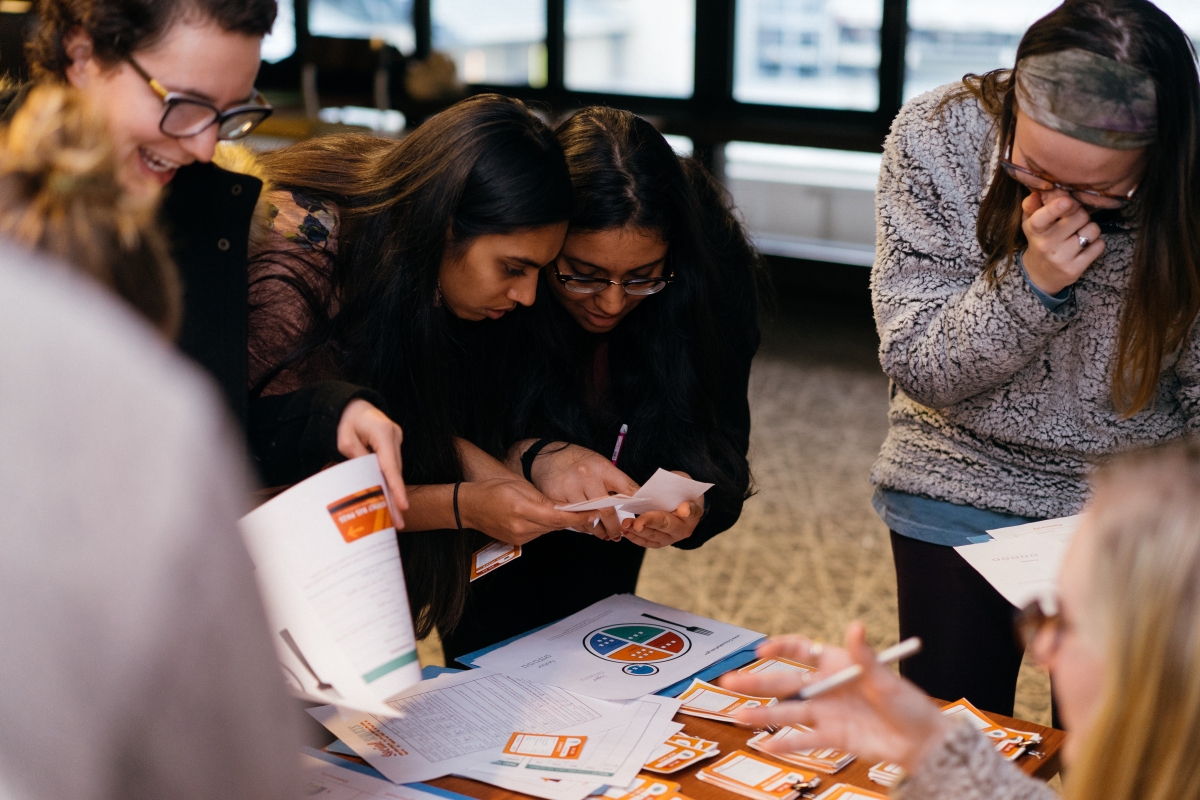Affiliated Course: HTS 2803: Semester in the City
Professor: Todd Michney, School of History and Sociology (WINNER of the 2018 SLS Excellence in Community-Engaged Sustainability Teaching Award)
Partner: Grove Park Foundation
SLS Priority Issue: Equitable and Sustainable Development
Project & Course Description: “Semester in the City” is a combination of in-class and hands-on, experiential learning, offering students the opportunity to engage with local neighborhoods as well as local government and nonprofit offices, and in-town libraries and archives. Students look at nearby areas like English Avenue and Vine City from a variety of perspectives – historical, social, political, economic, and environmental, among others. By collaborating with organized neighborhood residents through course partner the Grove Park Foundation, students strengthen these communities’ ties to Georgia Tech and in the process of engagement, promote sustainability as a means to potentially transform civic life and values in the Atlanta metro area.
Student Comment about Course Impact: “We were not saving anyone. We were simply aligning ourselves WITH the community, engaging in roles they are currently doing themselves. . . . This is a crucial concept I take with me in my career from volunteer work to public involvement for projects.”
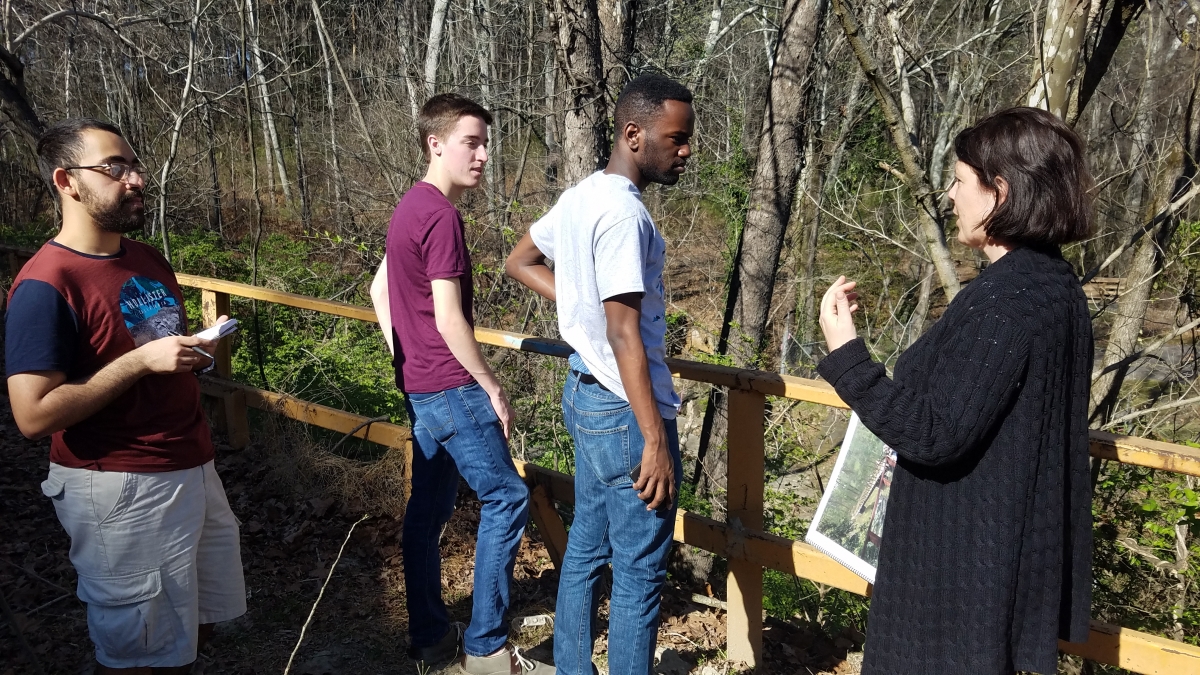
Affiliated Course: EAS 4221: Environmental Geochemistry Lab
Professor: Jennifer Glass, School of Earth and Atmospheric Sciences
Partner: West Atlanta Watershed Alliance
SLS Priority Issue: Green Infrastructure, Water, and Citizen Science
Project & Course Description: Environmental Geochemistry Lab integrates the perspectives of local scholars and community members, such as the board chair of the West Atlanta Watershed Alliance (WAWA), residents of West Atlanta, and the outreach professionals of the U.S. Fish and Wildlife Service. Students build both technical and collaborative skills—those core to successful “science communication”—by working with diverse partners to explore the intersections between environment, society, and economy. The lab class’s stream testing is sited in West Atlanta and the Proctor Creek watershed so that students can connect the concepts of environmental racism and justice to the watershed “in Tech’s backyard.”
Student Comment on Course Impact: “I had never experienced a lab where it felt like the topics we were learning might make a difference to people we had met. The ability to get the story of the community from someone who had lived in the area, and had seen all the contamination, brought home the importance of what we were learning. At the end of the lab, we had the opportunity to present our findings to the community and saw first-hand how scientific language can either engage community members or distance them from the science.”
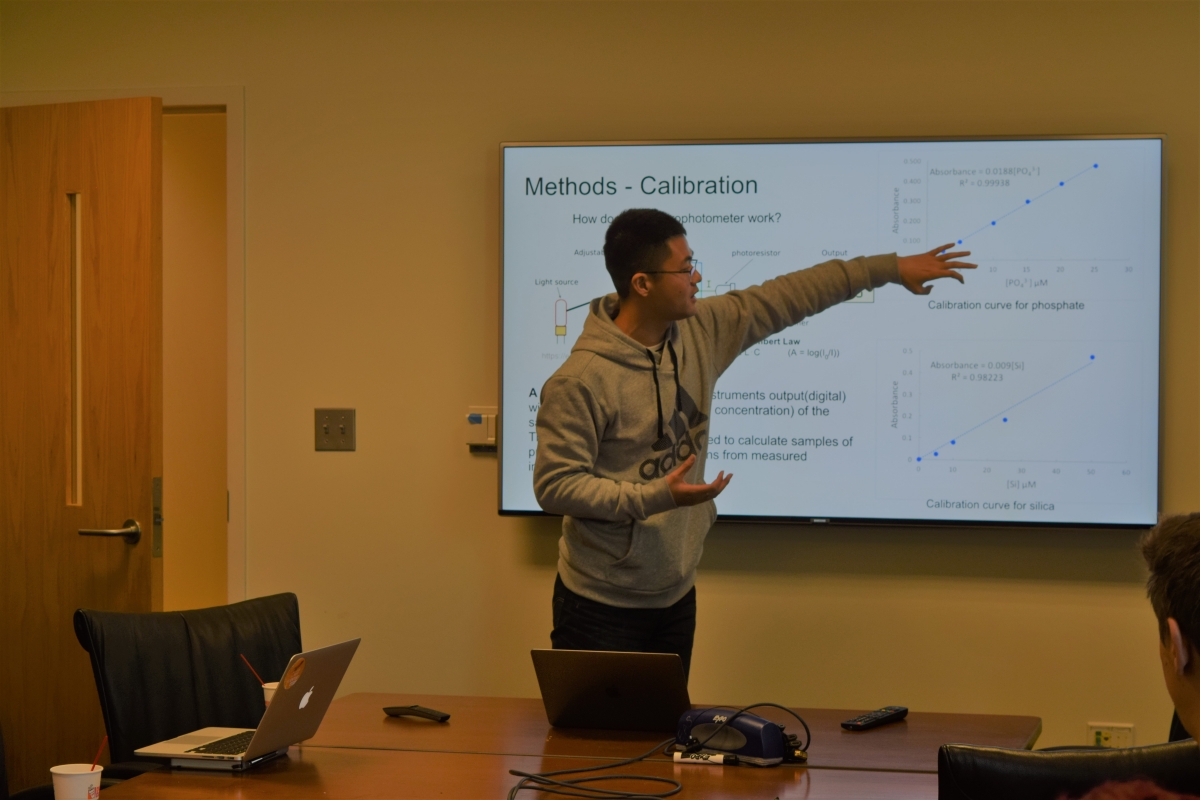
Affiliated Program: Serve-Learn-Sustain in Spain
Professor: Kelly Comfort, School of Modern Languages
Partner: Ecocampus Granada and of Idea Servicios Educativos, Culturales y Ambientales
Course/Program Description: The Serve-Learn-Sustain in Spain program is offered each spring semester by the School of Modern Languages. The program offers 12 to 15 credits of upper-division Spanish toward the Spanish certificate (12 credits) or toward a Spanish minor (15 credits) in just four months abroad. Both SPAN 4156 and SPAN 4157 state as their aim the task of “creating sustainable communities.” Through service-learning projects, cultural and linguistic immersion activities, student-organized roundtable discussions with community partners, and field-based needs-assessment projects, students learn how to integrate themselves into the local culture, understand the diverse communities in which they serve, and gain intercultural competence and place-based perspective in addressing challenges.
Student Comment on Program Impact: “We were able to tour greenhouses and taste fresh vegetables, walk through the largest solar research facility in Spain, tour a smart city, dive into Sustainable Ecotourism with an overnight stay in a cave hotel, and work with ECOCAMPUS to diversify the local insect and bird populations! The hands-on interactions with the local and regional communities provided via this SLS program was incredible! I feel as if I know the city of Granada as well as I know Atlanta (and I grew up here!).”
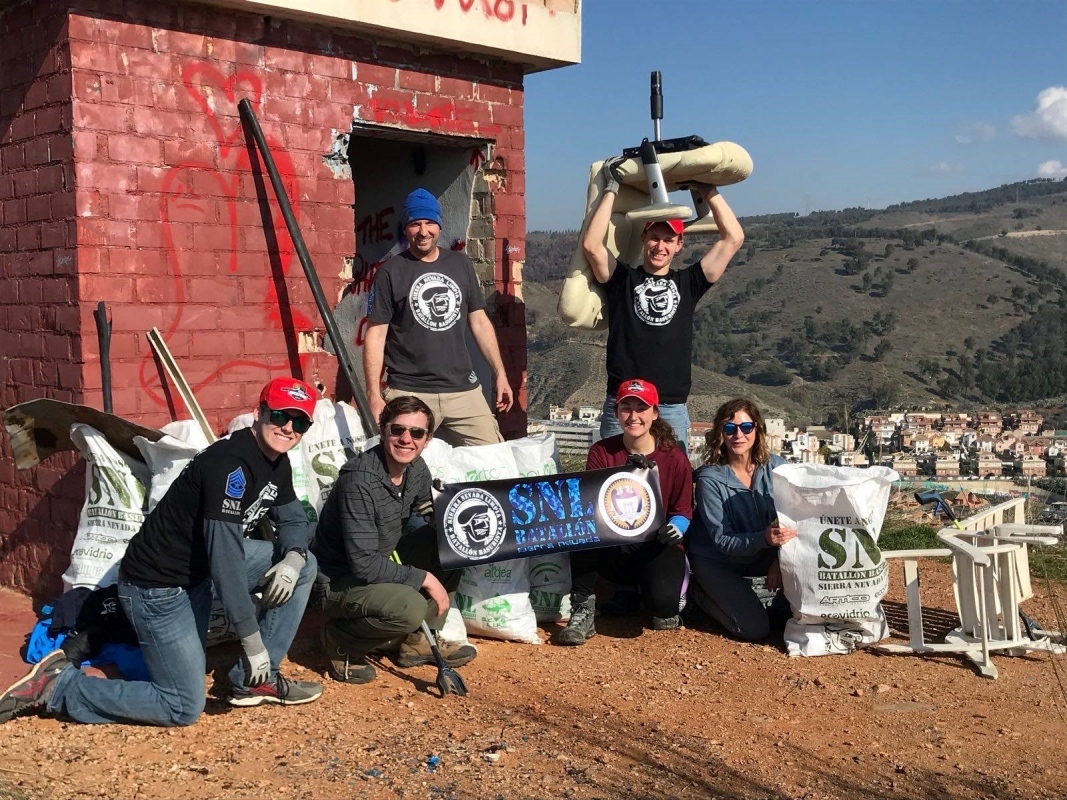
Affiliated Course: MGT 4803: Business Decisions for Shared Value
Professor: Ravi Subramanian, Scheller College of Business
Partner: Garry Harris, Center for Sustainable Communities
SLS Priority Issue: Social Innovation
Course & Project Description: At the heart of the concept of “business sustainability and shared value” are interconnections among the economic, environmental, and societal dimensions of business performance. This course uses the 2017 World Economic Forum Global Risks Report and the United Nations Sustainable Development Goals as frameworks to establish the role of fundamental human needs (food, water, shelter, energy, wages, and community) in shaping long-term business value and overall economic progress. The course partner is the Center for Sustainable Communities and EcoDistrict Hampton Roads in Virginia. In Spring 2019, student teams researched, developed, and proposed creative development plans for the neighborhood of over 5,000 homes and 17,000 residents, focused on building community resilience through economic development, small business cultivation, and local health and wellness.
Student Comment on Course Impact: "Thanks to the experiential learning method, the stakes were high. Our recommendations actually had the potential to impact a real community. I'm thankful to our professor and Mr. Harris for taking our work seriously and exhorting us to do the same."
Partner Comment on Students’ Impact: “What an exceptional pleasure it has been to engage in meaningful projects with these phenomenal young minds...their focus and thorough investigation and subsequent design and development of useful outcomes will directly benefit thousands of residents and potentially raise the quality of life in the [Hampton Roads EcoDistrict] for generations to come."
Read more about this project HERE.

Sustainability Partnerships in Action: Courses and Research 3
Affiliated Course: CS 3750: Introduction to User Interface Design
Professor: Rosa Arriaga, School of Interactive Computing
Partner: United Way and SPARC (Strong Partnerships Activating Real Change)
SLS Priority Issue: Social Innovation
Course Description: In this course students work through the entire User Centered Design Cycle: requirements gathering, designing alternatives, prototyping and evaluation. They work on a project that matters to our community partners. In the past this has included: Community Engagement and Art on the Beltline, Community Engagement and Safety on the Beltline, Supporting Veterans with Goal Setting and Achievement, and United Way/SPARC (Strong Partnerships Activating Real Change). This course provides an opportunity for reciprocal teaching and learning. The students learn about real world problems and the community members are exposed to novel ways of understanding the problem and novel approaches/designs to “solving” the problems. The recent partnership with United Way invited students to explore the importance of connectedness –especially in communities of economically vulnerable residents—and to devise creative means for residents to share information, events, and resources that increase community cohesion.
Student Comment on Course Impact:
“Having the ability to directly work with United Way and SPARC was an invaluable learning experience because it allowed me to truly appreciate and understand the “end user” while finding a way to apply my developing skills to a well-deserving community. This continuous partnership pushed me to do my best because it brought my team’s idea into a wholesome reality.”
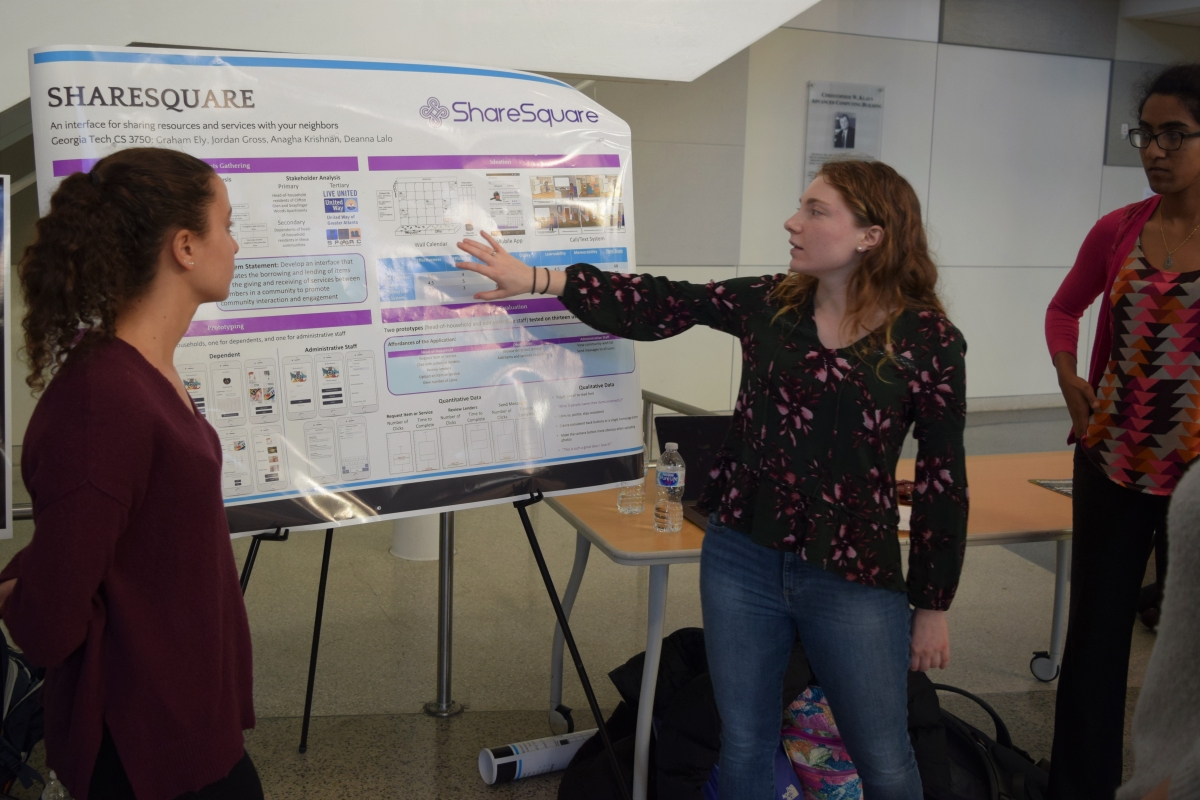
Affiliated Course: HTS 3086: Sociology of Medicine and Health
Professor: Jennifer Singh, School of History and Sociology (WINNER of the 2019 SLS Excellence in Community-Engaged Sustainability Teaching Award)
SLS Priority Issue: Community Health
Course Description: This course introduces students to the sociology of medicine and health (also known as medical sociology or sociology of health and illness), which is a broad field examining the social production of health, wellness, illness and mortality. This sub-discipline of sociology starts from the assumption that we cannot understand the topics of health and illness simply by looking at biological phenomena and medical knowledge. Thus, a main objective of this course is to enable students to describe the social, political, economic, and cultural forces that influence social behavior by exploring health, illness, and health care from a sociological perspective. The course ise designed and instructed around student community engagement with local non-profit organizations that serve social needs directly related to health. Past and current course partners include the Healthy Heart Coalition and the Atlanta Community Food Bank. These partnerships allowed students to be trained in administering CPR and then shared that CPR training and heart healthy living resources to community members who are at greater risk for heart disease and other SES-linked health conditions.
Student Comment on Course Impact: “I vividly remember talking about the social determinants of health in class and almost immediately being able to draw connections to my own experiences with healthcare. With a few more probing questions from reflection assignments I found myself thinking how much these principles govern our concentric circles of community. Being able to take this knowledge and apply it first hand in the Atlanta community grounded these theories and empowered me to take action.”
